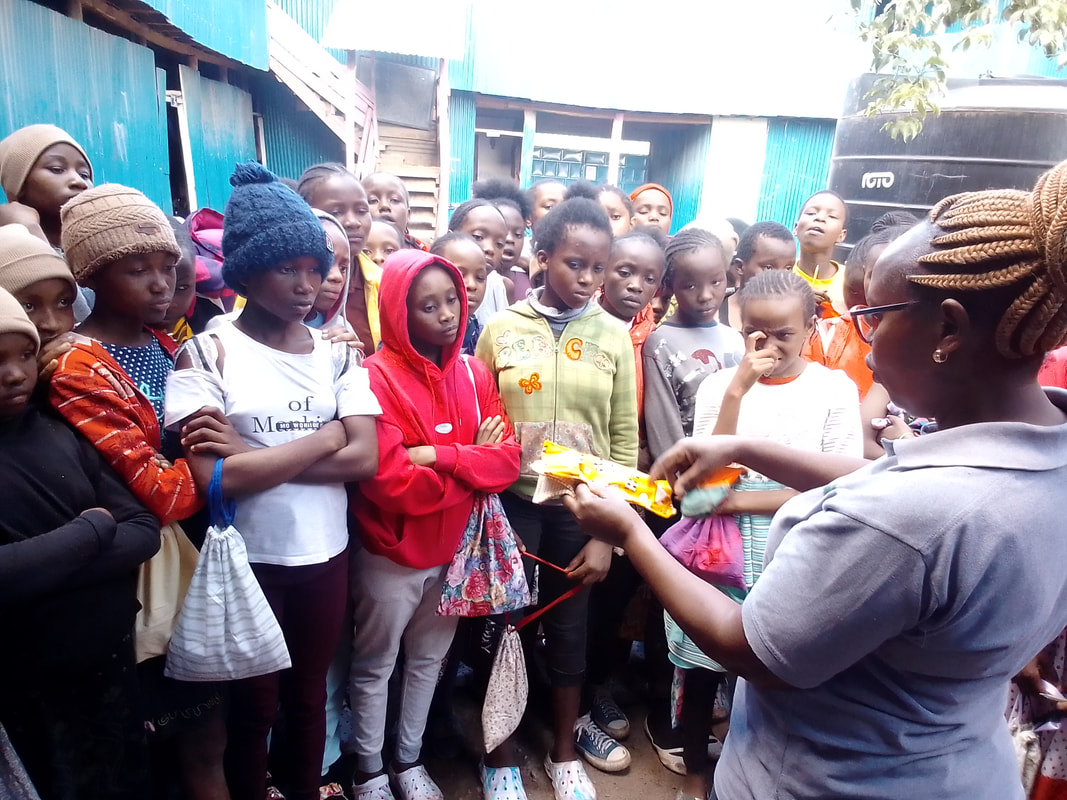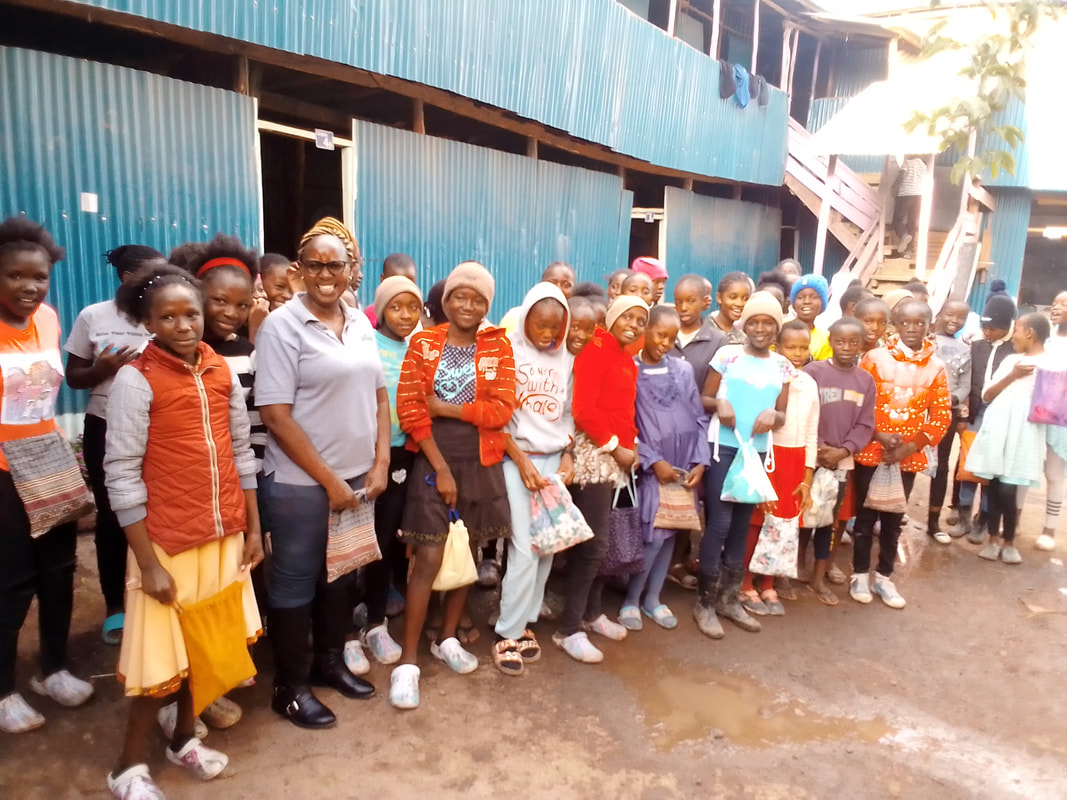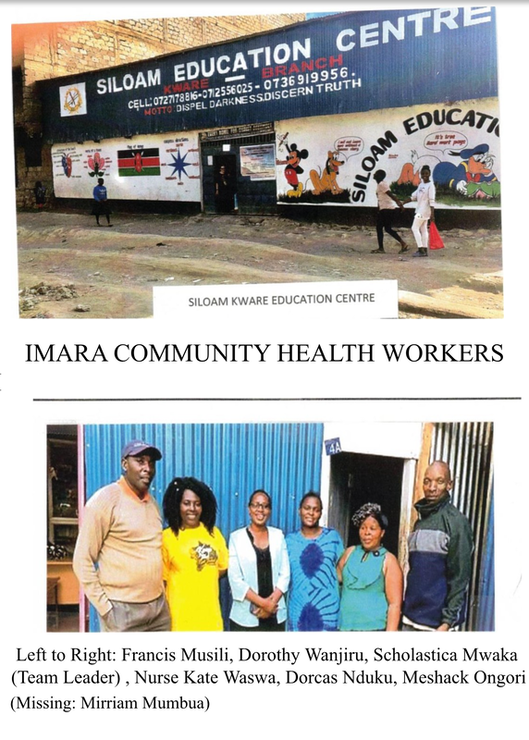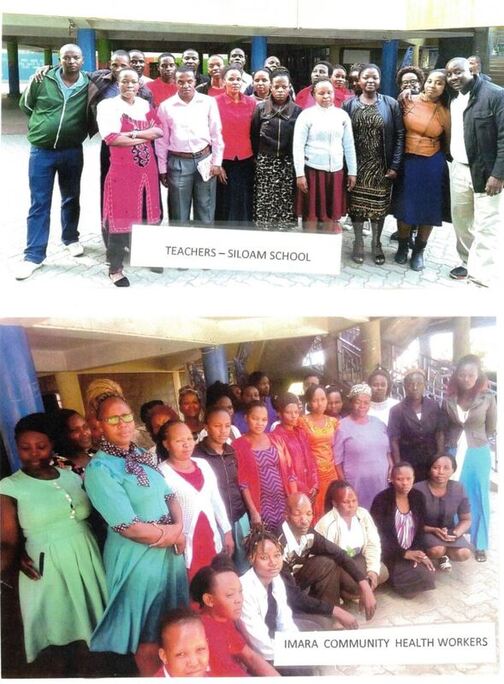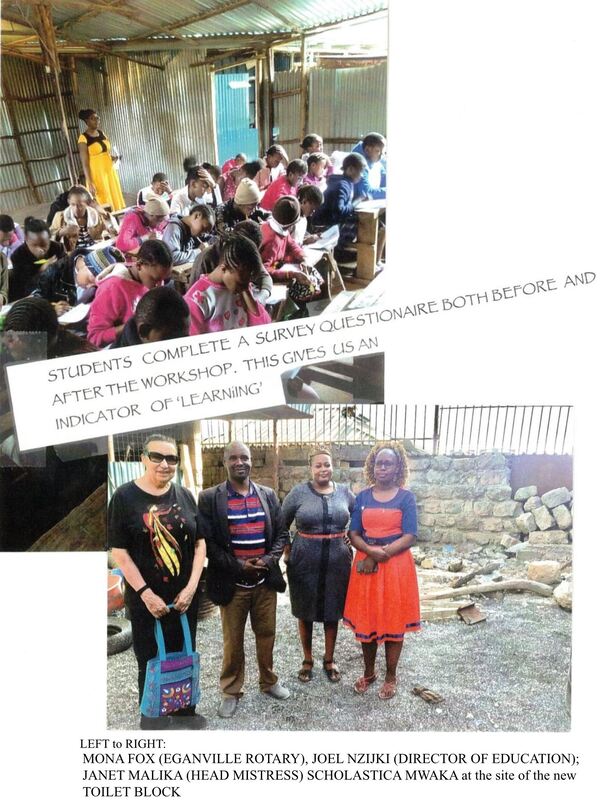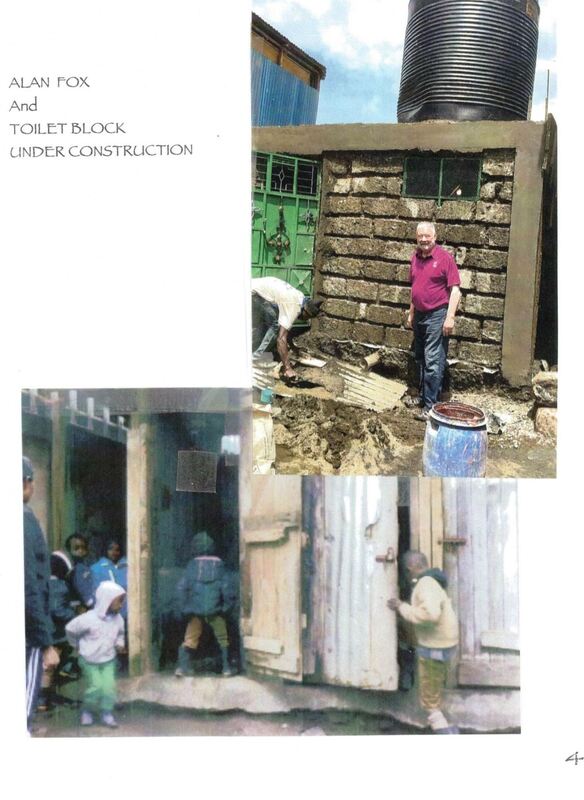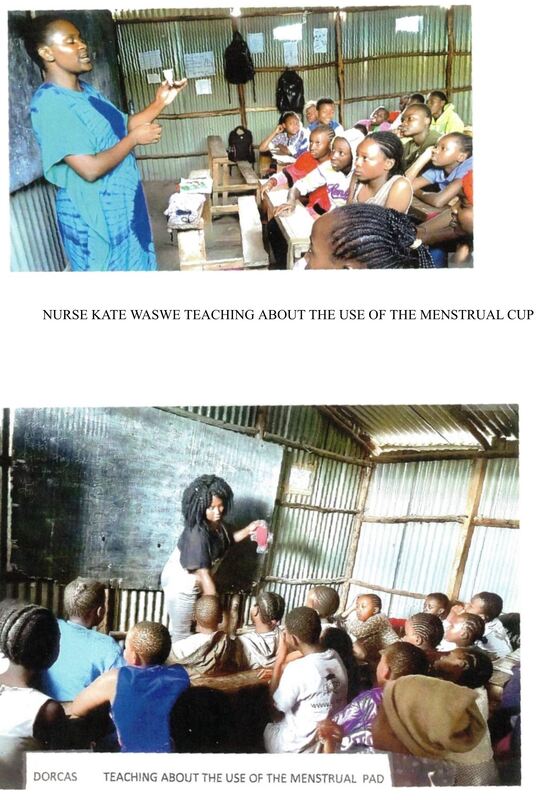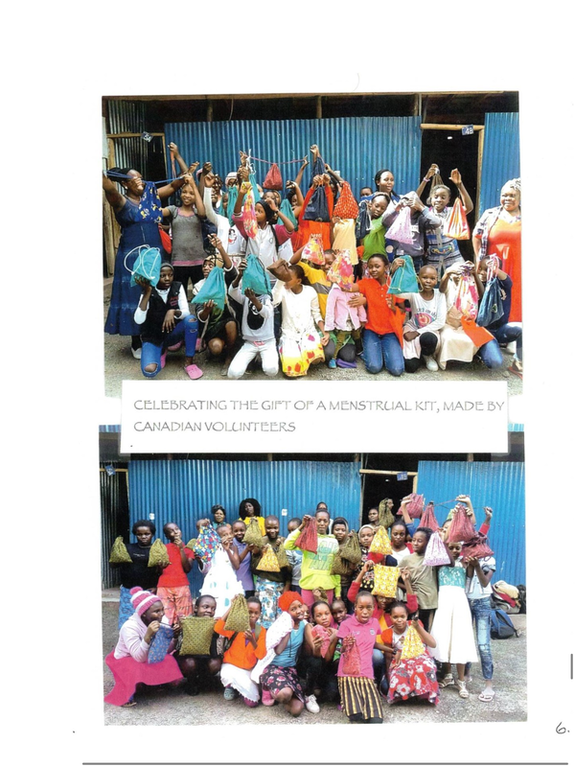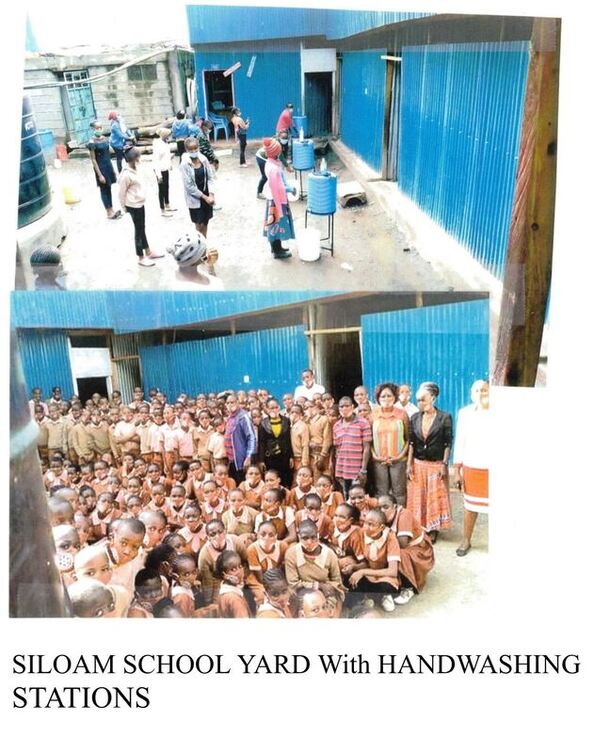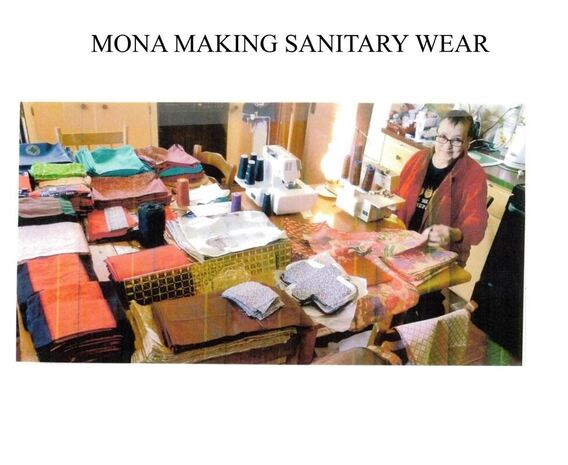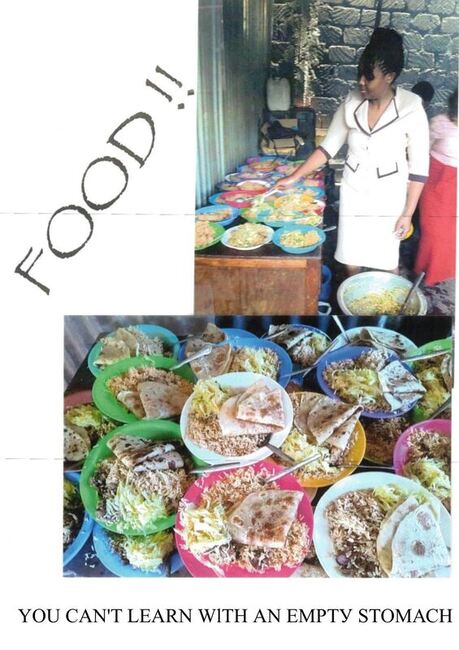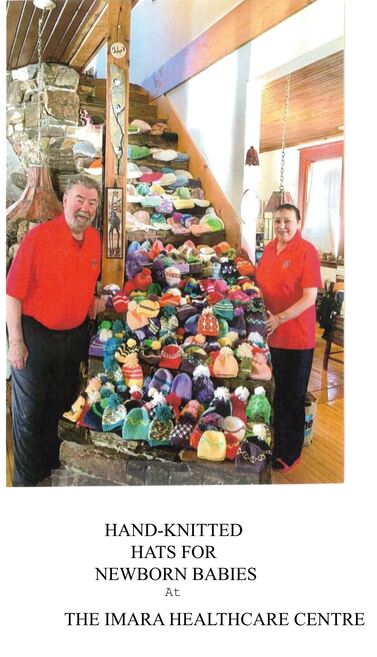
REPORT TO
THE ROTARY CLUB OF EGANVILLE CHARITABLE TRUST
AND
ITS PARTNERS ON THE PROJECT
'EDUCATION TO CHANGE THE LIVES OF CHILDREN
IN THE MUKURU SLUM'
NAIROBI
THE ROTARY CLUB OF EGANVILLE CHARITABLE TRUST
AND
ITS PARTNERS ON THE PROJECT
'EDUCATION TO CHANGE THE LIVES OF CHILDREN
IN THE MUKURU SLUM'
NAIROBI
Update: November 2022
106 menstrual hygiene kits were distributed to Siloam students as they prepare to take their long school break until January 2023. Rotary wishes them a happy and safe holiday.
106 menstrual hygiene kits were distributed to Siloam students as they prepare to take their long school break until January 2023. Rotary wishes them a happy and safe holiday.
OUR HOPES and ASPIRATIONS
This project aims to improve the lives of girls at the Siloam School in the Mukuru, slum of Nairobi. This will be achieved by teaching Menstrual Hygiene Management (MHM), so that girls no longer need feel embarrassed about their monthly period or have to miss school because they do not have access to sanitary wear. When girls are able to attend school full time because they have access to sanitary wear and a place at school where they can change in private, they do well in their education and are able to get rewarding jobs. They become empowered. As a result, their families are better off and so is their community. And it’s a small
step towards the eradication of poverty.
“Canada seeks to eradicate poverty and believes that the most effective way to do so is by improving the lives of
women and girls.”
Former Minister of International Development
The Honorable Marie-Claude Bibeau
INTRODUCTION
In Kenya, as in much of the developing world, as soon as a girl starts menstruating, her life changes dramatically. Her responsibility to get water for the family every day and help her mother cook and look after siblings, leaves little time available for schoolwork. If she has no access to sanitary wear, she could miss up to five days a month, or 20% of her schooling when she has her period. This will put at risk completion of her high school
education and limit her opportunities to find interesting and rewarding work.
THE PROBLEM
The following is a common scenario in many Mukuru homes:
Girl in the family gets her monthly period and stays home from school. She misses school because she is embarrassed about going to school while she is menstruating. She doesn’t feel clean and worries that others will notice. She falls behind in her schoolwork and her grades suffer. She gradually loses confidence in herself and eventually drops out of school. She gets married at a young age, has children and is destined to a life in the home looking after her husband and children. This is not just a loss for the girl. Keeping girls in school is vital not
just for the girls themselves but for a poor country’s economic development. Research shows that when a girl stays in school everyone benefits because educated girls turn into empowered women.
The solution is complex as there are longstanding traditions about the place and role of the ‘girl child’ in the African family. However, change will only take place if the stigma of menstruation is challenged, and adolescent girls are taught to be self-confident and proud of their gender. An effective way to accomplish this is through training at a
Menstrual Hygiene Management (MHM) workshop.
PROJECT LAUNCH
Grants to Eganville Rotary from the Women’s Inter Church Council of Canada (WICC) and from the Rotary Clubs of West Ottawa and Arnprior, enabled the launch of a research and training project in 2019 with the following two objectives:
1. Hold Menstrual Hygiene Management (MHM) Workshops at
Siloam Kware Primary School,
2. Provide female students at Siloam School with sanitary wear.
MENSTRUAL HYGIENE MANAGEMENT (MHM) WORKSHOPS
MHM is workshop training to educate young girls about the arrival of their monthly period and the role of menstruation in human reproduction. Emphasis is placed on hygiene in the home, including hand-washing, and the hygienic management of the monthly menstrual cycle. Topics addressed at the workshop include:
WHAT HAVE WE ACCOMPLISHED ?
(a) Planning Workshops: Before holding workshops with the female students, three planning
workshops were held. The first was held in 2018 and attended by 36 young girls. Then in 2019 a workshop on menstruation was attended by the female teachers and the female community health workers (chws). The third planning workshop was on the transition of Boys to Men and was attended by the male teachers as well as members of the board of trustees. The objective of these planning workshops was to ensure that all
the adults at the school were familiar with the training the students were receiving. It was also an opportunity for the health workers to fine-tune their presentations.
(b) Hold MHM Workshops
Some 300 girls attended a four-hour workshop between October 2019 and mid-March 2020, just before all schools in Kenya were shut down due to the global pandemic. Despite the school year being cut-back there have been significant accomplishments:
(c) Menstrual Kits
Menstrual Kits have been sewn by volunteers in Canada. When Alan and Mona Fox went to Nairobi in April 2019, they took with them 400 holders, 400 shields/liners, 900 pads and 160 drawstring bags. In addition, two chws, Dorcas Nzuki and Vera Tabitha, contributed by making drawstring bags, sanitary pads, and waterproof bags on their machines at home. The last graduating class in November 2019 was given the choice
of using a reusable pad or alternatively, using a menstrual cup. The cup is made of a high-grade medical plastic and will usually last 10 years or more, compared with one or two years for the reusable pad. Out of 60 students graduating, 45 chose the menstrual cups. The menstrual cups were only offered to the senior girls in the graduating class and a parent’s signature approving the purchase was required.
(d) Sanitation Upgrade
There is little point encouraging girls to go to school while they have their period, if there is nowhere private for them to change. With support from the Rotary clubs of Arnprior, West Ottawa and Eganville, as well as Siloam School, a new toilet block was built while the school was closed for the Easter 2019 holidays. The toilet block contains five female toilets, four boy’s toilets and a boy’s urinal in addition to a girls changing room. There is no need to incur the cost to have the toilets pumped as they are now connected to the municipal sewer.
This is a major improvement in the school’s sanitation.
(e) Access to Sanitary Wear
Access to sanitary wear is a National health issue. The National government legislated the distribution of free sanitary towels to Kenyan school girls in 2017. But they are not getting to poor girls who need them most. It was reported in Nairobi’s Daily Nation that out of an allocation of 470 million KES for sanitary wear, 107
million KES had gone missing. According to the Gates Foundation Report (Menstrual Health in Kenya: A
Country Landscape Analysis 2017) the primary road block facing the advancement of Kenyan girls is the lack of access to sanitary wear at an affordable price. Rotary’s effort to make available sanitary wear is focused on the
girls at Siloam School. The main source of sanitary wear has been the work of Mona Fox and her dedicated team of volunteers. They expect to have made 400 drawstring bags, 400 shields, 400 waterproof transport bags
and 1,000 sanitary pads, by the Fall 2021. The challenge now is to transport the sanitary wear from Canada
to Nairobi. We had hoped to fly to Nairobi and bring all the sanitary wear as ‘passenger baggage’ and hope Air Canada would waive excess baggage charges (as they did in 2019) because it was
humanitarian aid. Unfortunately, the global pandemic was declared before our planned departure in April/May 2020 and it has become prohibitively expensive or impossible to fly since then. We are hoping international air travel will open up this fall or winter 2021-2022 and we can take the sanitary wear to Nairobi with us when we go.
(f) Training the Trainers
The Training for Trainers workshop was a learning opportunity for the Imara Community Healthcare Workers (chws). They were fortunate to have the able assistance of public nurse, Kate Waswa, to lead the workshop on menstruation. She then assisted Rotary Team Leader, Scholastica Mwaka and her team of chws to
deliver the training workshops to some 300 female students at Siloam School. It is hoped that the experience acquired during this project will give the chws the skills and the confidence to conduct similar workshops at other schools or organizations.
(g) Communications
On completion of the project, Eganville Rotary, with the assistance of Scholastica, will distribute this report to the relevant education authorities in Kenya. It will also be distributed to the Rotary clubs that have provided funding for the project or expressed interest in it.
(h) Stigma and Awareness
Attitudes towards menstruation will not change unless the stigma is challenged, and a greater emphasis is placed on education. That there is much misinformation about menstruation is evident from a survey of young pre-menstrual girls. Some 80% of these girls thought menstruation was “an abnormality or disease” and 15% had no knowledge of menstruation at all. Much information about menstruation is learned from friends or on
the street. And much of it is wrong. The Gates Foundation Report found that only 12% of girls feel comfortable talking with their mothers about her menstruation and it gets relatively little attention in school because teachers feel uncomfortable teaching the subject.
The depth of feeling about the menstruation taboo is illustrated by the tragic death of Jackline Chepngeno. In September 2020 this 14 year-old girl was ridiculed and humiliated in front of her class by
her teacher for having soiled her dress. She was sent home to change but when she arrived home, she hanged herself.
EVALUATION
Before any female student attends the MHM Workshop, she must fill out a detailed questionnaire which asks questions about her knowledge about menstruation and her existing practice in managing her menstrual cycle.
Questions are also asked about her self-esteem and her attitude towards schooling. The student is asked to complete the questionnaire again, two or three months after the workshop, so that we can find out what the student has learned and how her self-confidence and attitude to schooling may have changed. We
have been unable to do that in 2020 because of the government enforced school closures during the pandemic.
However, schools opened again in January 2021 and we were able to hold an Evaluation Workshop in March 2021. This workshop is interesting as it included students who had used their menstrual cups for three or four months. These cups are made from high grade medical plastic and will last about ten years, compared with the reusable pads, which are expected to last one or two years. Most girls preferred the former because of the cost
implications.
RESEARCH TEAM RECOMMENDATIONS
The Rotary Research Team made the following recommendations, which are supported by
Alan Fox, Research Director:
RAPE and BULLYING PREVENTION FOR CHILDREN and ADOLESCENTS
For the last 18 months the Rotary team has been focused on the education of girls and especially how self-image affects educational performance. The Menstruation workshops are intended to impart knowledge and build confidence in girls. From the feedback we have received, it sounds as if it is working, In our consultations for the Menstruation Project, we were encouraged not to forget the boy child. We will therefor consider boy/girl relations as part of a broader discussion on life skills. We are also considering a new training initiative on an issue that
merits urgent attention. That is the prevention of bullying, sexual interference and rape of children and adolescents. The workshop will try to understand why children bully and the role of family, friends, teachers, and community in rape prevention. We hope to collaborate with The Visionary Women’s Centre (VWC) in Turbo Kenya which has developed the program.
TO OUR SPONSORS,THANK YOU FOR YOUR SUPPORT
This project was made possible because of the generous support of many individuals and group sponsors. These included the following Rotary Clubs and other non-governmental organizations:
Rotary Club of Arnprior
Rotary Club of Chesterville
Rotary Club of Cataraqui-Kingston
Rotary Club of Eganville
Rotary Club of Gananoque
Rotary Club of Kingston
Rotary Club of Montreal Lakeshore
Rotary Club of North Renfrew
Rotary Club of Pembroke
Rotary Club of West Ottawa
The Women’s Inter-Church Council of Canada (WICC)
The Canadian Union of Public Employees (CUPE)
The Fellowship of the Least Coin (World Council of Churches)
Thank you to the many individuals who have contributed to our work
in Mukuru, Nairobi. For further information on Eganville Rotary’s
International Programs, see: www.eganvillerotary.com
If you wish to contribute to Rotary’s International Programs you can donate online or by sending a cheque to:
The Treasurer, Eganville Rotary
PO Box 788
Eganville ON K0J 1T0
Please write “International” on the memo line of the cheque.
Thank you.
APPENDICES
No. 1 Scholastica’s Evaluation Report on the MHM Workshop
No. 2 Team Members – Opinions on the MHM Workshop format
No. 3 Students/Facilitator Discussion on Menstrual Cup Usage
No. 4 Scholastica & Nurse Kate : Reflections on the Menstruation Project
APPENDIX 1
Team Leader Scholarstic Mwaka: Evaluation Report
Knowledge of Menstruation
Girls have gotten some knowledge on menstruation periods. Before the girls didn’t have a clear picture on it and they had different beliefs. Some of these beliefs associated with the cultural view on menstruation that only thought it’s a taboo to discuss about it since their parents hardly speaks about it while others thought it’s for
grown up women. This program has made the girls understand better menstruation and the hygiene required to keep infections at bay. Others even thought its sickness. Sickness would come when proper hygiene was not observed, and this was clearly taught. No doubt the girls had the right information now.
Menstrual Management
The girls have knowledge on other products to manage their periods, but the use of ruby cups is new to them. Our concentration was based on the ruby cups and the re-usable pads. We made sure every girl had something of their choice to manage their periods. I decided to make phone call follow-up on the girls we gave the cups
so that we are sure extra precaution are taken during this pandemic. Washing hands always on insertion of the cup is very important and would be a precautionary measure. Again, menstruation will never be stopped by a pandemic and that’s why everyone who participated in this initiative should smile that 300 girls in Siloam, Mukuru have something to manage menstruation.
Social Life
Before, most of the girls could not afford products to manage their periods. They could not carry out the normal duties, neither at home nor at school. Some ended up missing school or missing extra
curriculum activities at school. They are happy that this is solved for the longest time.
Self Esteem
During menstruation periods, 85% of the girls confessed to feel unworthy and not happy about it. The stigma they experience from the boys is too much. Some teachers will also embarrass them. They feel that no one understands them especially when the mood swing engulfs them. They were happy that even the teachers have
undergone the workshop and no more embarrassment. They are overcoming their fears even to an extent of teaching their parents what they learn.
APPENDIX 2
Team Members Evaluation Report
Participants answered the following questions anonymously:
1. What will you remember most from this training?
2. What did you learn from this training?
3 What are your positive impressions about this training?
7. Please rate this training on a scale of 1 – 10. Ten is the highest
APPENDIX No. 3
Student and Facilitator discussion about menstrual cup
Students and graduates from the initial workshops attended an evaluation workshop on
November 28 th 2020. A discussion was held to share experiences with the cup. The following
comments will be helpful in future MHM workshops and evaluations:
1. About 80% of the parents gave the girls approval to try the cup and see how it works.
2. The cup exhibits discomfort when poorly inserted. Some girls had not initially managed the proper
insertion technique.
3. Almost all the girls were afraid the cup would interfere with the hymen and reassurance to the
contrary had to be given.
4. While in boarding school students are not using the cup because there is not enough accessible
hot water to clean the device. Most of the girls who are using the cup are in day school and can go
home and sanitize the device in the evening.
5. The girls with re-usable pads are okay and feel comfortable using them.
6. It was discovered there's leakage with the cup for girls with heavy flows.
7. There was some complaint of pain when removing the cupbecause of the pressure of pushing it out.
It was suggested that this might be because they did not twist the cup to allow some air in and
detach the cup from the vagina. The facilitators recommended that more time be given to
get used to the cup as the cup is something new in Mukuru. Practice and time will be needed.
APPENDIX 4
Reflections on the Rotary Menstruation (MHM) Project.
With all the Covid -19 measures and protocols being observed, an evaluation was done to the various girls who had carried home the reusable pads and menstrual cups and feedback was given according to each one’s unique experience after using either the menstrual cup or reusable pad.We had a one-on-one individual discussion (IDs) with the girls who used menstrual cups and also engaged all who used the reusable pads in a Focused Group Discussion (FDGs) which was very interactive
Topics discussed included include:
on male involvement.
Feedback
The Menstrual (RUBY) cup
The girls were very curious to try out the cups and have a feel of it with some doubts. On discussing with their parents, they got motivated when parents encouraged them to try them out and so it gave them confidence to use them again. Others got encourage by their friends whom they shared with the knowledge about menstrual
cups and went ahead to use them. Most girls reported feeling funny the first day they used the cups but became better and comfortable the consequent days and months thus resulting in an increased demand for the menstrual cups.
Re–usable menstrual pads
These were found to be very easy and comfortable to use by the girls, also easy to clean and maintain them. Same as cups, most girls got motivated by their parents and siblings who welcomed the idea positively. They were happy it has helped to reduce the allergies most of them got, leakages since they could change as
often as possible and not worry about expenses of buying pads. Most girls can confidently explain the menstrual cycle and its importance to the girl child, how to manage pain and keeping themselves and the environment clean and safe during menstruation. They now understand the changes in their bodies and relate with the different stages of growth (puberty). Hygiene has greatly improved in the school with presence of the new toilets
(THANKS TO THE ROTARY CLUB), because they are now enough and well separated i.e. boys and girls, hand washing points also increased and so cleanliness is now on a higher level and the same practice has been extended home.
Myths and misconceptions have no place now since the girls got empowered and in turn empowered their friends, siblings and even some parents. Most girls have started building confidence and talk freely to their
brothers back at home about menstruation, we had some who were confidently discussing with boys of their class what we have been teaching them and how to assist them in case they needed their help.
In general, this programme has changed the attitude of many girls, boys and teachers towards menstruation and hygiene management and with continuous engagements and refresher on the same,
Mukuru Siloam will be a better place thus greater empowerment to the whole community. The programme has helped in reducing teenage pregnancies in Mukuru and in the county as per the health statistics in the county.
We didn’t report any teenage pregnancy in Siloam and we thank the Thanks to Rotary Club for your support.
The girls also learned about the importance of their own well-being and how to handle life challenges during their growth and development.
My HEALTH my RESPONSIBILITY! Is our slogan.
Prepared by Kate and Scholar
26
PHOTO APPENDICES
(See separate file)
1. THE COMMUNITY HEALTH WORKER
RESEARCH/TRAINING TEAM
2. SILOAM TEACHERS & THE IMARA COMMUNITY HEALTH
WORKERS
3. STUDENTS IN CLASS & SITE OF THE NEW TOILET BLOCK
WITH JOEL & JANET FROM SILOAM SCHOOL & HEALTH
WORKER TEAM LEADER, SCHOLASTICA MWAKA
4. NEW & OLD TOILETS
5. TEACHING STUDENTS ABOUT SANITARY WEAR
6. CELEBRATING THE GIFT OF MENSTRUAL KITS
7. MASKS AND HAND WASHING
8. MONA MAKING SANITARY WEAR
9. FOOD
10. THE WORK OF CANADIAN KNITTERS
Alan Fox
Coordinator, International Service
Rotary Club of Eganville
Ontario, Canada
This project aims to improve the lives of girls at the Siloam School in the Mukuru, slum of Nairobi. This will be achieved by teaching Menstrual Hygiene Management (MHM), so that girls no longer need feel embarrassed about their monthly period or have to miss school because they do not have access to sanitary wear. When girls are able to attend school full time because they have access to sanitary wear and a place at school where they can change in private, they do well in their education and are able to get rewarding jobs. They become empowered. As a result, their families are better off and so is their community. And it’s a small
step towards the eradication of poverty.
“Canada seeks to eradicate poverty and believes that the most effective way to do so is by improving the lives of
women and girls.”
Former Minister of International Development
The Honorable Marie-Claude Bibeau
INTRODUCTION
In Kenya, as in much of the developing world, as soon as a girl starts menstruating, her life changes dramatically. Her responsibility to get water for the family every day and help her mother cook and look after siblings, leaves little time available for schoolwork. If she has no access to sanitary wear, she could miss up to five days a month, or 20% of her schooling when she has her period. This will put at risk completion of her high school
education and limit her opportunities to find interesting and rewarding work.
THE PROBLEM
The following is a common scenario in many Mukuru homes:
Girl in the family gets her monthly period and stays home from school. She misses school because she is embarrassed about going to school while she is menstruating. She doesn’t feel clean and worries that others will notice. She falls behind in her schoolwork and her grades suffer. She gradually loses confidence in herself and eventually drops out of school. She gets married at a young age, has children and is destined to a life in the home looking after her husband and children. This is not just a loss for the girl. Keeping girls in school is vital not
just for the girls themselves but for a poor country’s economic development. Research shows that when a girl stays in school everyone benefits because educated girls turn into empowered women.
The solution is complex as there are longstanding traditions about the place and role of the ‘girl child’ in the African family. However, change will only take place if the stigma of menstruation is challenged, and adolescent girls are taught to be self-confident and proud of their gender. An effective way to accomplish this is through training at a
Menstrual Hygiene Management (MHM) workshop.
PROJECT LAUNCH
Grants to Eganville Rotary from the Women’s Inter Church Council of Canada (WICC) and from the Rotary Clubs of West Ottawa and Arnprior, enabled the launch of a research and training project in 2019 with the following two objectives:
1. Hold Menstrual Hygiene Management (MHM) Workshops at
Siloam Kware Primary School,
2. Provide female students at Siloam School with sanitary wear.
MENSTRUAL HYGIENE MANAGEMENT (MHM) WORKSHOPS
MHM is workshop training to educate young girls about the arrival of their monthly period and the role of menstruation in human reproduction. Emphasis is placed on hygiene in the home, including hand-washing, and the hygienic management of the monthly menstrual cycle. Topics addressed at the workshop include:
- Myths about menstruation
- The menstrual cycle – the facts
- Puberty, mood changes and hormones
- Monthly management using recyclable pads or menstrual cups
- Hygiene and consequences of poor management
- Pain management
- The role of boys and men
- Well-being
WHAT HAVE WE ACCOMPLISHED ?
(a) Planning Workshops: Before holding workshops with the female students, three planning
workshops were held. The first was held in 2018 and attended by 36 young girls. Then in 2019 a workshop on menstruation was attended by the female teachers and the female community health workers (chws). The third planning workshop was on the transition of Boys to Men and was attended by the male teachers as well as members of the board of trustees. The objective of these planning workshops was to ensure that all
the adults at the school were familiar with the training the students were receiving. It was also an opportunity for the health workers to fine-tune their presentations.
(b) Hold MHM Workshops
Some 300 girls attended a four-hour workshop between October 2019 and mid-March 2020, just before all schools in Kenya were shut down due to the global pandemic. Despite the school year being cut-back there have been significant accomplishments:
- The MHM workshop was taken by over 300 girls who are now well informed about the function of menstruation and its hygienic management,
- Siloam school teachers took the training and it is expected this will enhance their knowledge of the subject and their comfort level in teaching it to boys and girls
- Learning does not stop at the school gates. Children talk about what they have learned at school and so knowledge about the importance of hand washing and other hygienic practices is passed on to family and friends.
- These conversations help break down the stigma of menstruation.
- It was suggested that boys should learn more about menstruation and should be more understanding of the
(c) Menstrual Kits
Menstrual Kits have been sewn by volunteers in Canada. When Alan and Mona Fox went to Nairobi in April 2019, they took with them 400 holders, 400 shields/liners, 900 pads and 160 drawstring bags. In addition, two chws, Dorcas Nzuki and Vera Tabitha, contributed by making drawstring bags, sanitary pads, and waterproof bags on their machines at home. The last graduating class in November 2019 was given the choice
of using a reusable pad or alternatively, using a menstrual cup. The cup is made of a high-grade medical plastic and will usually last 10 years or more, compared with one or two years for the reusable pad. Out of 60 students graduating, 45 chose the menstrual cups. The menstrual cups were only offered to the senior girls in the graduating class and a parent’s signature approving the purchase was required.
(d) Sanitation Upgrade
There is little point encouraging girls to go to school while they have their period, if there is nowhere private for them to change. With support from the Rotary clubs of Arnprior, West Ottawa and Eganville, as well as Siloam School, a new toilet block was built while the school was closed for the Easter 2019 holidays. The toilet block contains five female toilets, four boy’s toilets and a boy’s urinal in addition to a girls changing room. There is no need to incur the cost to have the toilets pumped as they are now connected to the municipal sewer.
This is a major improvement in the school’s sanitation.
(e) Access to Sanitary Wear
Access to sanitary wear is a National health issue. The National government legislated the distribution of free sanitary towels to Kenyan school girls in 2017. But they are not getting to poor girls who need them most. It was reported in Nairobi’s Daily Nation that out of an allocation of 470 million KES for sanitary wear, 107
million KES had gone missing. According to the Gates Foundation Report (Menstrual Health in Kenya: A
Country Landscape Analysis 2017) the primary road block facing the advancement of Kenyan girls is the lack of access to sanitary wear at an affordable price. Rotary’s effort to make available sanitary wear is focused on the
girls at Siloam School. The main source of sanitary wear has been the work of Mona Fox and her dedicated team of volunteers. They expect to have made 400 drawstring bags, 400 shields, 400 waterproof transport bags
and 1,000 sanitary pads, by the Fall 2021. The challenge now is to transport the sanitary wear from Canada
to Nairobi. We had hoped to fly to Nairobi and bring all the sanitary wear as ‘passenger baggage’ and hope Air Canada would waive excess baggage charges (as they did in 2019) because it was
humanitarian aid. Unfortunately, the global pandemic was declared before our planned departure in April/May 2020 and it has become prohibitively expensive or impossible to fly since then. We are hoping international air travel will open up this fall or winter 2021-2022 and we can take the sanitary wear to Nairobi with us when we go.
(f) Training the Trainers
The Training for Trainers workshop was a learning opportunity for the Imara Community Healthcare Workers (chws). They were fortunate to have the able assistance of public nurse, Kate Waswa, to lead the workshop on menstruation. She then assisted Rotary Team Leader, Scholastica Mwaka and her team of chws to
deliver the training workshops to some 300 female students at Siloam School. It is hoped that the experience acquired during this project will give the chws the skills and the confidence to conduct similar workshops at other schools or organizations.
(g) Communications
On completion of the project, Eganville Rotary, with the assistance of Scholastica, will distribute this report to the relevant education authorities in Kenya. It will also be distributed to the Rotary clubs that have provided funding for the project or expressed interest in it.
(h) Stigma and Awareness
Attitudes towards menstruation will not change unless the stigma is challenged, and a greater emphasis is placed on education. That there is much misinformation about menstruation is evident from a survey of young pre-menstrual girls. Some 80% of these girls thought menstruation was “an abnormality or disease” and 15% had no knowledge of menstruation at all. Much information about menstruation is learned from friends or on
the street. And much of it is wrong. The Gates Foundation Report found that only 12% of girls feel comfortable talking with their mothers about her menstruation and it gets relatively little attention in school because teachers feel uncomfortable teaching the subject.
The depth of feeling about the menstruation taboo is illustrated by the tragic death of Jackline Chepngeno. In September 2020 this 14 year-old girl was ridiculed and humiliated in front of her class by
her teacher for having soiled her dress. She was sent home to change but when she arrived home, she hanged herself.
EVALUATION
Before any female student attends the MHM Workshop, she must fill out a detailed questionnaire which asks questions about her knowledge about menstruation and her existing practice in managing her menstrual cycle.
Questions are also asked about her self-esteem and her attitude towards schooling. The student is asked to complete the questionnaire again, two or three months after the workshop, so that we can find out what the student has learned and how her self-confidence and attitude to schooling may have changed. We
have been unable to do that in 2020 because of the government enforced school closures during the pandemic.
However, schools opened again in January 2021 and we were able to hold an Evaluation Workshop in March 2021. This workshop is interesting as it included students who had used their menstrual cups for three or four months. These cups are made from high grade medical plastic and will last about ten years, compared with the reusable pads, which are expected to last one or two years. Most girls preferred the former because of the cost
implications.
RESEARCH TEAM RECOMMENDATIONS
The Rotary Research Team made the following recommendations, which are supported by
Alan Fox, Research Director:
- The girls should be given the freedom to choose what product works best for them
- Preference should be given to reusable sanitary pads or, menstrual cups rather than disposable pads
- The boy child should be given the same opportunity as the girl child to learn about puberty and should be encouraged to support girls rather than stigmatizing them
- The Imara chws should have the opportunity to take continued training on menstrual health management (MHM)
RAPE and BULLYING PREVENTION FOR CHILDREN and ADOLESCENTS
For the last 18 months the Rotary team has been focused on the education of girls and especially how self-image affects educational performance. The Menstruation workshops are intended to impart knowledge and build confidence in girls. From the feedback we have received, it sounds as if it is working, In our consultations for the Menstruation Project, we were encouraged not to forget the boy child. We will therefor consider boy/girl relations as part of a broader discussion on life skills. We are also considering a new training initiative on an issue that
merits urgent attention. That is the prevention of bullying, sexual interference and rape of children and adolescents. The workshop will try to understand why children bully and the role of family, friends, teachers, and community in rape prevention. We hope to collaborate with The Visionary Women’s Centre (VWC) in Turbo Kenya which has developed the program.
TO OUR SPONSORS,THANK YOU FOR YOUR SUPPORT
This project was made possible because of the generous support of many individuals and group sponsors. These included the following Rotary Clubs and other non-governmental organizations:
Rotary Club of Arnprior
Rotary Club of Chesterville
Rotary Club of Cataraqui-Kingston
Rotary Club of Eganville
Rotary Club of Gananoque
Rotary Club of Kingston
Rotary Club of Montreal Lakeshore
Rotary Club of North Renfrew
Rotary Club of Pembroke
Rotary Club of West Ottawa
The Women’s Inter-Church Council of Canada (WICC)
The Canadian Union of Public Employees (CUPE)
The Fellowship of the Least Coin (World Council of Churches)
Thank you to the many individuals who have contributed to our work
in Mukuru, Nairobi. For further information on Eganville Rotary’s
International Programs, see: www.eganvillerotary.com
If you wish to contribute to Rotary’s International Programs you can donate online or by sending a cheque to:
The Treasurer, Eganville Rotary
PO Box 788
Eganville ON K0J 1T0
Please write “International” on the memo line of the cheque.
Thank you.
APPENDICES
No. 1 Scholastica’s Evaluation Report on the MHM Workshop
No. 2 Team Members – Opinions on the MHM Workshop format
No. 3 Students/Facilitator Discussion on Menstrual Cup Usage
No. 4 Scholastica & Nurse Kate : Reflections on the Menstruation Project
APPENDIX 1
Team Leader Scholarstic Mwaka: Evaluation Report
Knowledge of Menstruation
Girls have gotten some knowledge on menstruation periods. Before the girls didn’t have a clear picture on it and they had different beliefs. Some of these beliefs associated with the cultural view on menstruation that only thought it’s a taboo to discuss about it since their parents hardly speaks about it while others thought it’s for
grown up women. This program has made the girls understand better menstruation and the hygiene required to keep infections at bay. Others even thought its sickness. Sickness would come when proper hygiene was not observed, and this was clearly taught. No doubt the girls had the right information now.
Menstrual Management
The girls have knowledge on other products to manage their periods, but the use of ruby cups is new to them. Our concentration was based on the ruby cups and the re-usable pads. We made sure every girl had something of their choice to manage their periods. I decided to make phone call follow-up on the girls we gave the cups
so that we are sure extra precaution are taken during this pandemic. Washing hands always on insertion of the cup is very important and would be a precautionary measure. Again, menstruation will never be stopped by a pandemic and that’s why everyone who participated in this initiative should smile that 300 girls in Siloam, Mukuru have something to manage menstruation.
Social Life
Before, most of the girls could not afford products to manage their periods. They could not carry out the normal duties, neither at home nor at school. Some ended up missing school or missing extra
curriculum activities at school. They are happy that this is solved for the longest time.
Self Esteem
During menstruation periods, 85% of the girls confessed to feel unworthy and not happy about it. The stigma they experience from the boys is too much. Some teachers will also embarrass them. They feel that no one understands them especially when the mood swing engulfs them. They were happy that even the teachers have
undergone the workshop and no more embarrassment. They are overcoming their fears even to an extent of teaching their parents what they learn.
APPENDIX 2
Team Members Evaluation Report
Participants answered the following questions anonymously:
1. What will you remember most from this training?
- Use of menstrual cups since it is a new idea
- Pain management in MHM
- Men’s role in MHM
- How to assist physically and mentally challenged during menstruation
- Psychological and emotional management during puberty
2. What did you learn from this training?
- - Importance of good practices during menstruation
- - The need to educate the community on MHM
- - Challenges faced by girls and women during menstruation and how to handle them
- - Proper care and disposal of MHM products after use
- - What we need to ensure proper MHM: toilets, water, soap, education on MHM; informed professionals.
- Space for changing and cleaning
- MHM products safely
3 What are your positive impressions about this training?
- - Detailed information and right answers to questions i.e. clear explanations
- - Relevant topic to the scope of my work
- - Audibility and eloquence open and ready to teach from known to unknown, no shying off from the facts
- - Good language understood by everyone
- - Good explanation of the menstrual cycle
- - Good time management
- - Very little time for such an elaborate and interesting topic (Need more time for training, at least 2 days)
- - Very few men present in the class. Involve more men
- - No projector for the video
- - Be a MHM advocate
- - Teach women and girls more on MHM, clarify facts and demystify myths on MHM
- - Support the already affected girls and walk them through the MHM journey
- - Help boys and girls understand themselves and each other during puberty through to adolescence
- - If possible, let’s have more of these sessions in different areas of the community
- - Congrats for the good work
- - Visit schools
- - Sincere appreciation to the initiators and organizers of this training for it has taught us a lot.
7. Please rate this training on a scale of 1 – 10. Ten is the highest
- - The workshop was rated at 93% by the participants
APPENDIX No. 3
Student and Facilitator discussion about menstrual cup
Students and graduates from the initial workshops attended an evaluation workshop on
November 28 th 2020. A discussion was held to share experiences with the cup. The following
comments will be helpful in future MHM workshops and evaluations:
1. About 80% of the parents gave the girls approval to try the cup and see how it works.
2. The cup exhibits discomfort when poorly inserted. Some girls had not initially managed the proper
insertion technique.
3. Almost all the girls were afraid the cup would interfere with the hymen and reassurance to the
contrary had to be given.
4. While in boarding school students are not using the cup because there is not enough accessible
hot water to clean the device. Most of the girls who are using the cup are in day school and can go
home and sanitize the device in the evening.
5. The girls with re-usable pads are okay and feel comfortable using them.
6. It was discovered there's leakage with the cup for girls with heavy flows.
7. There was some complaint of pain when removing the cupbecause of the pressure of pushing it out.
It was suggested that this might be because they did not twist the cup to allow some air in and
detach the cup from the vagina. The facilitators recommended that more time be given to
get used to the cup as the cup is something new in Mukuru. Practice and time will be needed.
APPENDIX 4
Reflections on the Rotary Menstruation (MHM) Project.
With all the Covid -19 measures and protocols being observed, an evaluation was done to the various girls who had carried home the reusable pads and menstrual cups and feedback was given according to each one’s unique experience after using either the menstrual cup or reusable pad.We had a one-on-one individual discussion (IDs) with the girls who used menstrual cups and also engaged all who used the reusable pads in a Focused Group Discussion (FDGs) which was very interactive
Topics discussed included include:
- Puberty, mood changes and hormones
- The menstrual cycle – the facts
- Myths and misconceptions
- Monthly management of menstruation using re-usable pads and cups
- Proper hygiene during menstrual management, consequences of poor hygiene management
- Pain management
- The role of boys and men
- General well-being and confidence issues as girls in the society
- These are same topics that were addressed in the beginning before rolling out
on male involvement.
Feedback
The Menstrual (RUBY) cup
The girls were very curious to try out the cups and have a feel of it with some doubts. On discussing with their parents, they got motivated when parents encouraged them to try them out and so it gave them confidence to use them again. Others got encourage by their friends whom they shared with the knowledge about menstrual
cups and went ahead to use them. Most girls reported feeling funny the first day they used the cups but became better and comfortable the consequent days and months thus resulting in an increased demand for the menstrual cups.
Re–usable menstrual pads
These were found to be very easy and comfortable to use by the girls, also easy to clean and maintain them. Same as cups, most girls got motivated by their parents and siblings who welcomed the idea positively. They were happy it has helped to reduce the allergies most of them got, leakages since they could change as
often as possible and not worry about expenses of buying pads. Most girls can confidently explain the menstrual cycle and its importance to the girl child, how to manage pain and keeping themselves and the environment clean and safe during menstruation. They now understand the changes in their bodies and relate with the different stages of growth (puberty). Hygiene has greatly improved in the school with presence of the new toilets
(THANKS TO THE ROTARY CLUB), because they are now enough and well separated i.e. boys and girls, hand washing points also increased and so cleanliness is now on a higher level and the same practice has been extended home.
Myths and misconceptions have no place now since the girls got empowered and in turn empowered their friends, siblings and even some parents. Most girls have started building confidence and talk freely to their
brothers back at home about menstruation, we had some who were confidently discussing with boys of their class what we have been teaching them and how to assist them in case they needed their help.
In general, this programme has changed the attitude of many girls, boys and teachers towards menstruation and hygiene management and with continuous engagements and refresher on the same,
Mukuru Siloam will be a better place thus greater empowerment to the whole community. The programme has helped in reducing teenage pregnancies in Mukuru and in the county as per the health statistics in the county.
We didn’t report any teenage pregnancy in Siloam and we thank the Thanks to Rotary Club for your support.
The girls also learned about the importance of their own well-being and how to handle life challenges during their growth and development.
My HEALTH my RESPONSIBILITY! Is our slogan.
Prepared by Kate and Scholar
26
PHOTO APPENDICES
(See separate file)
1. THE COMMUNITY HEALTH WORKER
RESEARCH/TRAINING TEAM
2. SILOAM TEACHERS & THE IMARA COMMUNITY HEALTH
WORKERS
3. STUDENTS IN CLASS & SITE OF THE NEW TOILET BLOCK
WITH JOEL & JANET FROM SILOAM SCHOOL & HEALTH
WORKER TEAM LEADER, SCHOLASTICA MWAKA
4. NEW & OLD TOILETS
5. TEACHING STUDENTS ABOUT SANITARY WEAR
6. CELEBRATING THE GIFT OF MENSTRUAL KITS
7. MASKS AND HAND WASHING
8. MONA MAKING SANITARY WEAR
9. FOOD
10. THE WORK OF CANADIAN KNITTERS
Alan Fox
Coordinator, International Service
Rotary Club of Eganville
Ontario, Canada
June 2021
